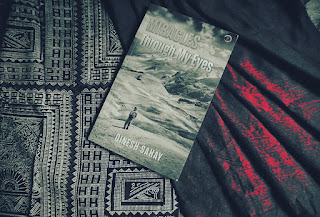Getting lessons on life from experienced people has always
been considered valuable. To share his own viewpoints and takeaway from his
experiences, Dinesh Sahay writes his book “Miracles Through My Eyes”.
The title itself is very revealing and expressive. ‘Miracles’
gives it that element of unforeseen surprise, and the word ‘my’ adds a nice personal
touch from the author’s perspective. ‘Miracles through my eyes’ thereby becomes
a book through which Sahay wants to spread wisdom and instill an unwavering
faith in the readers.
The book essentially falls is the non-fiction genre,
and the narration juggles between the description of the author’s past experiences
and his strategies to lead a more fulfilling life. After reading, the first general
thought that seemed to loom large on my mind was the belief in the almighty and
undoubtful faith in destiny. Starting from these two basic ideas, Sahay writes
in detail on the basis of his motivational discourse. The author is a large believer
in the almighty and he emphasizes on the fact that anything in this world can
be achieved by the power of positive thinking, determination, and consistent
efforts. His faith in the power of wishful thinking and his unconditional
dedication to his positive mindset is visible all throughout the book.
Sahay gives examples of many miracles from his life.
He is of the opinion that miracles are not absurd, sudden happenings. He says
that miracles happen around us every day, and we can spot them only if we are
ready to introspect and analyze. Ranging from miracles in marriage to miracles in
monetary gains, he makes sure to support his lessons by many relatable
incidents from his life.
In no way, does the book rely on superstitions.
Stemming out of a very progressive and fresh mindset, the book only gives emphasis
to man’s own power, and the extent of possibilities at his disposal. The tone
therefore naturally is very advisory and motivating, urging the readers to apply
the teachings in their own lives. Sahay’s words are enriching, and he tries
hard to inculcate his values into the hearts of the readers.
The authors’ wide array of experiences and his
recollections are very fascinating to learn about. Because of his transferrable
job and work-life in many sectors, he has collected quite a diversity of
personal takeaways. He tries to support his morals with the help of these stories.
The downside of the book, in my opinion, was that it hardly left any room for individualistic approaches to life, that will differ from person to person. At one point, the narration became too dictatorial and overly manipulative. The author should have held back his own imposition of ideas on the readers, and instead give them scope to learn it themselves. The practicality of the narration was genuine, but it could have been more engaging and universal. The author was always speaking from his own perspective and recollecting events from his own life, and this somehow was too cyclical. To give it a perennial touch, he could have included discourses from other notable personalities or shared the life stories of other individuals so as to widen the field of understanding. Moreover, the author was often imposing too many ideas against atheism, and this could be a downside for someone who is not a believer of God. There was very little space for co-existence of ideas, apart from the author’s own thoughts and this often made the book overly preachy.
Additionally, the book certainly has a very inspiring
dais, based upon which we can launch our own self-confidence. It urges us to
never lose hope, never question our potential and never turn into greedy, self-centred
beings. The author promotes harmony and helpfulness, and mutual cooperation. He
shatters the notion that work is to be done in the pretext of accumulating
wealth. Instead, he motivates us to be more generous humans and do our karma
without worrying much about the probable outcomes.






Post a Comment